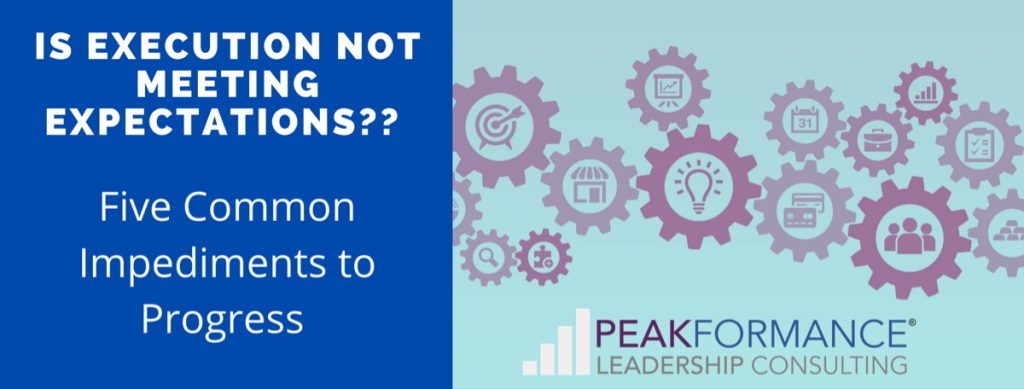5 Common Impediments to Progress
One of the most challenging leadership responsibilities is aligning the team and organization in a way that drives progress. Developing ideas, strategies, and concepts is the easier part – execution is where things tend to bog down. It is important to define a thoughtful strategic path forward. But it is even more critical to develop an organization that can execute. Based on my own experience I have identified five of the most common impediments to progress:
- Strategy Scope Exceeds Execution Capacity – In the interest of progress there is a tendency to try and pack too much into a project and timeline. Jamie Diamond was once quoted saying; “I’d rather have a first rate execution and a second rate strategy……” Sometimes “less is more” and scaling back a bit to keep the project scope manageable will better position it for success. It is important to be thoughtful in managing the scope to stay within your capacity to execute. Focusing on small wins can really add up over time and build momentum.
- Unclear Task Assignments – When assignment is unclear the tasks are likely to languish or end up at the bottom of to-do lists. Clearly communicating task assignment and timeline expectations is a must. Then a reoccurring meeting on the calendar will provide the structure and follow-up necessary to keep things on track. Without an establish framework strategy has a way of fading away.
- Lack of Strategy Ownership – If the team is not involved in, or able to contribute to, the development of the strategy they are much less likely to buy-in and support it (despite your expectation they should!). Encouraging participation and collaboration will engage the team and inspire enthusiasm to contribute in a meaningful way. Helping the team connect to the big picture builds enthusiasm and ownership.
- Insufficient Accountability for Progress – When tasks are not getting done it is important for leaders to jump into the weeds and figure out why. It might be lack of resources, an inability to prioritize, or a misunderstanding of expectations. All of which can be addressed to get back on track. However, allowing missed deadlines and lack of progress implies the project is not important and enables the behavior to continue. Be certain accountability is the highest priority throughout!
- Consumed by Fighting Fires – In this day and age of hyper-expectations the strong magnetic forces of tactical activities can take over and derail the best of intentions. Fighting fires can consume so much time, effort, and energy that there is little left to spend on strategy. Evaluating how time is being spent can help illuminate why strategy is not being executed. In order to advance the organization, develop innovation, and make meaningful progress there has to be sufficient capacity to execute strategic initiatives. It there is no time for strategy now – when will there be?
If you have a project or strategy that can’t seem to get traction there is a pretty good chance one or more of these impediments are at play. Take some time to collaborate with the team and reflect on why things are not getting done. Then develop a plan to better position the organization for success. The long-term viability of the organization is dependent on it. Teams that can consistently execute will come out winners!
As an Executive Leadership Coach and Strategic Advisor Joe partners with leaders to help them reinforce fundamentals and expand their leadership capacity. Learn more about coaching and advisory services and schedule time with Joe at: www.peakformanceconsulting.com/contact.
